Podcast: Play in new window | Download
Subscribe: Apple Podcasts | RSS
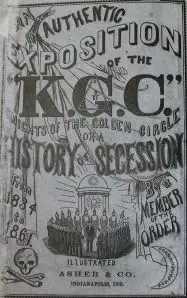 We will examine a very interesting era of history for both sides of the border and we will delve into the realm of secret societies and behind-the-scenes plots of the powerful. Very few people know of the Knights of the Golden Circle and their grand plan to take over Mexico, enslave most of its population and unite it with the southern US, Central America, parts of South America and the islands of the Caribbean.
We will examine a very interesting era of history for both sides of the border and we will delve into the realm of secret societies and behind-the-scenes plots of the powerful. Very few people know of the Knights of the Golden Circle and their grand plan to take over Mexico, enslave most of its population and unite it with the southern US, Central America, parts of South America and the islands of the Caribbean.
So, who were the Knights of the Golden Circle? The organization formed sometime in the 1850s and had its origins in the Southern Rights Clubs – or SRCs – that sprung up throughout the United States in the 1830s. The mid 19th Century in the US saw many secret societies, it was almost fashionable to belong to one, and some had interesting names. There was the Knights of the Columbian Star, the American Knights, the Corps de Belgium, the Democratic Invincible Club, the Knights of the Mighty Host and the Knights of the Circle of Honor, to name a few, along with a rise in Freemasonry, a movement that would influence the Knights of the Golden Circle. Like many of the secret societies of the time, the Knights of the Golden circle had a secret set of bylaws, a secret membership roster with supposed numbers into the tens of thousands and a secret sign. From the Knights’ own manual, published in 1861, the secret sign was made by making “the forefinger and thumb of the right hands joined while with the rest of the hand upon the right eye is touching with the middle finger. The answer is the same with the left hand and left eye.” The greeting sign was important because, as mentioned before, the member 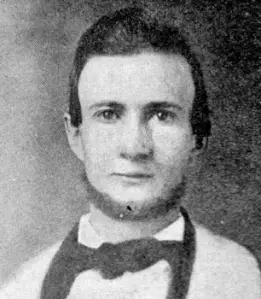 rolls were kept secret. There are rumors that President Franklin Pierce, John Wilkes Booth and the outlaw Jesse James were members of this group, along with many wealthy and powerful southern planters and politicians. The knights were organized into lodges called “castles” and there were dozens of these castles all over the United States, not just in the south. Castles were divided up into three degrees: military, financial and leadership, each with their own secret rites and regalia. To qualify for leadership in the organization, one must have been American born, a slave owner, Protestant, and have southern sympathies. The rank and file of the group, though, came from many walks of life. Even the Cherokee leader Stand Watie, along with many members of the Seminole and Muskogee Indian tribes, belonged to the Knights of the Golden Circle.
rolls were kept secret. There are rumors that President Franklin Pierce, John Wilkes Booth and the outlaw Jesse James were members of this group, along with many wealthy and powerful southern planters and politicians. The knights were organized into lodges called “castles” and there were dozens of these castles all over the United States, not just in the south. Castles were divided up into three degrees: military, financial and leadership, each with their own secret rites and regalia. To qualify for leadership in the organization, one must have been American born, a slave owner, Protestant, and have southern sympathies. The rank and file of the group, though, came from many walks of life. Even the Cherokee leader Stand Watie, along with many members of the Seminole and Muskogee Indian tribes, belonged to the Knights of the Golden Circle.
Although started by a man from Indiana named George Bickley, the knights we speak of had a distinctly southern leanings. They believed in slavery and its expansion, to include a revival of the trans-Atlantic slave trade. They combined their beliefs of the expansion of slavery with an idea of Manifest Destiny. They believed in the superiority of American Anglo-Saxon Protestant culture and wanted to spread that to new lands they would conquer. The “Golden Circle” in the name of the group comes from a curious geographical reference. Early in the group’s founding, the leaders picked Havana, Cuba as the capital and physical center of their new slave-based empire and drew a “golden circle” around Cuba to include the southern US, Mexico, Central America and the Caribbean islands along with parts of modern-day Colombia and Venezuela. The conquest of these lands would be incremental, beginning with Mexico, which seemed at the time to be the easiest place to start.
The Knight’s founder George Bickley was quite the charlatan and huckster and was the perfect person to sell the plan of southern expansion. He had 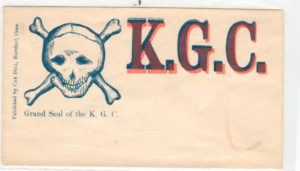 claimed to be a medical doctor who had been trained in England but even the people at the time had ways of finding out that he had been lying about his credentials. Because of his oratory skill and clarity of vision for a new world ruled by the knights, he appealed to the need for something greater in the hearts of the men he tried to influence. His plan to invade and conquer Mexico seems foolhardy now, but at the time people thought that it would work and were eager to get in on the ground floor of this endeavor. Bickley told followers that he wanted to take an army of 16,000 men across the border at Brownsville, Texas and march to the city of Guanajuato to establish his capital there. After the countryside was secured he wanted remaining Knights on the northern side of the Rio Grande to drive free blacks from the States to Mexico where they would join the Mexican peon class as a massive new group of slaves. Bickley promised his Knights key positions in the new government of Mexico which would be subdivided into 25 new states. Each person who took part in this expedition of conquest would receive 640 acres of land and enough slaves to work the land. Anyone professing the Roman Catholic religion would be excluded from public life in Mexico and could not serve in the new government. Bickley would rule as a monarch and would solidify power in Mexico until he resigned or died. There were strict stipulations for his successor: as he had no children, Bickley’s heir to the throne of Mexico needed to be at least 30 years old, a southerner and Protestant. The successor would carry out the second phase of the plan to complete the circle, and conquer Central America, the north of South America and the Caribbean islands. As the Knights of the Golden Circle was a very well-funded organization, the Spanish government was to be approached to buy Cuba first. If Spain did not want to sell Cuba to the Knights, they would attack the island and take it over by force.
claimed to be a medical doctor who had been trained in England but even the people at the time had ways of finding out that he had been lying about his credentials. Because of his oratory skill and clarity of vision for a new world ruled by the knights, he appealed to the need for something greater in the hearts of the men he tried to influence. His plan to invade and conquer Mexico seems foolhardy now, but at the time people thought that it would work and were eager to get in on the ground floor of this endeavor. Bickley told followers that he wanted to take an army of 16,000 men across the border at Brownsville, Texas and march to the city of Guanajuato to establish his capital there. After the countryside was secured he wanted remaining Knights on the northern side of the Rio Grande to drive free blacks from the States to Mexico where they would join the Mexican peon class as a massive new group of slaves. Bickley promised his Knights key positions in the new government of Mexico which would be subdivided into 25 new states. Each person who took part in this expedition of conquest would receive 640 acres of land and enough slaves to work the land. Anyone professing the Roman Catholic religion would be excluded from public life in Mexico and could not serve in the new government. Bickley would rule as a monarch and would solidify power in Mexico until he resigned or died. There were strict stipulations for his successor: as he had no children, Bickley’s heir to the throne of Mexico needed to be at least 30 years old, a southerner and Protestant. The successor would carry out the second phase of the plan to complete the circle, and conquer Central America, the north of South America and the Caribbean islands. As the Knights of the Golden Circle was a very well-funded organization, the Spanish government was to be approached to buy Cuba first. If Spain did not want to sell Cuba to the Knights, they would attack the island and take it over by force.
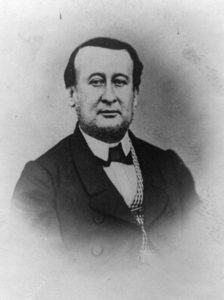 It may seem hard to believe, but the Knights of the Golden Circle had sympathizers and collaborators in Mexico, especially in the north. Let’s set the context for all of this on the other side of the border. Between 1857 and 1861 Mexico was embroiled in what was called the War of Reform. Liberals wanted to break the power of the Catholic Church and to decentralize power to the states. Conservatives wanted a highly centralized government ruling out of Mexico City and to keep the power of the Church and landholding elites intact. The conservatives seemed to be winning, and eventually did, when the Mexican elite invited the Austrian archduke Maximilian to rule over them as emperor. In the meantime the liberals were doing everything they could to break the power of the autocrats in Mexico City. This is how the alliance began between the Knights and the liberals of northern Mexico. A major Mexican player in the Golden Circle scheme was the governor of the state of Guanajuato, Manuel Doblado Partida.
It may seem hard to believe, but the Knights of the Golden Circle had sympathizers and collaborators in Mexico, especially in the north. Let’s set the context for all of this on the other side of the border. Between 1857 and 1861 Mexico was embroiled in what was called the War of Reform. Liberals wanted to break the power of the Catholic Church and to decentralize power to the states. Conservatives wanted a highly centralized government ruling out of Mexico City and to keep the power of the Church and landholding elites intact. The conservatives seemed to be winning, and eventually did, when the Mexican elite invited the Austrian archduke Maximilian to rule over them as emperor. In the meantime the liberals were doing everything they could to break the power of the autocrats in Mexico City. This is how the alliance began between the Knights and the liberals of northern Mexico. A major Mexican player in the Golden Circle scheme was the governor of the state of Guanajuato, Manuel Doblado Partida.
Governor Doblado invited Bickley to come to state of Guanajuato to set up his seat of power in the city of Guanajuato. If Bickley could raise an army of 16,000 men, Doblado said, the governor would provide an additional 16,000 men to conquer the rest of the country. No one really knows Doblado’s true intentions, but it is suspected that he just wanted to use the Knights for his own purposes, notably to overthrow the conservatives who were ruling from Mexico City. He knew that Bickley’s aim was to install himself as an absolute ruler of Mexico, but went along with the plan anyway. Governor Doblado promised the knights half the annual taxes collected in the state, which amounted to $840,000.00. The biggest part of Doblado’s offer included taking out mortgages on all public property in the state of Guanajuato and surrendering the proceeds to the knights. This amounted to a total of 23 million US dollars. Although the offer seemed too good to be true, the invasion was set for October 6, 1861.
We know that Mexico did not become part of a massive new slave empire, so what happened? The invasion force assembled at the border as indicated but fell short of men because of the outbreak of the Civil War. Thousands of men from New Orleans never showed up and with a much reduced force, the knights entered Mexico, only to be pushed back across the Rio Grande. The governor of Guanajuato, Manuel Doblado, was ousted by the conservatives and forced to flee Mexico or face a firing squad. He died in New York City a few years later in 1865.
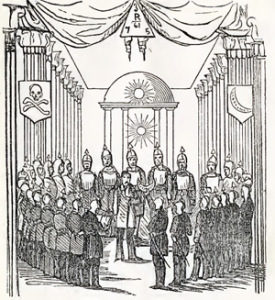 Plans to conquer Mexico were put on hold as the Knights of the Golden Circle shifted their attention to help the newly formed Confederate States of America. The different “castles” of the knights were still active in the northern states, and in parts of California, and aided the south in intelligence gathering and sabotage. In late 1863 the group ousted the original founder and changed its name to the Order of American Knights. They changed their name again in 1864, calling themselves the Order of the Sons of Liberty. Members were still called knights and all of the previous secrecy was still in effect.
Plans to conquer Mexico were put on hold as the Knights of the Golden Circle shifted their attention to help the newly formed Confederate States of America. The different “castles” of the knights were still active in the northern states, and in parts of California, and aided the south in intelligence gathering and sabotage. In late 1863 the group ousted the original founder and changed its name to the Order of American Knights. They changed their name again in 1864, calling themselves the Order of the Sons of Liberty. Members were still called knights and all of the previous secrecy was still in effect.
During its entire time of existence, the knights were well funded, initially getting the money for their treasury from wealthy southern planters. When it was evident that the south was losing the Civil War, the mission of the organization shifted once again. The money in the treasury was to be saved and augmented to fund a future Civil War to restore the Confederacy, and after that, a return to slavery, and then a return to the original plan of the group to conquer Mexico and other parts of Latin America and the Caribbean. The future war chest was divided into over 500 different caches across the United States for retrieval closer to the time of the planned war. As the old knights died out and the group disbanded in 1916, most of the caches of gold and silver coins were forgotten and remain scattered throughout the American countryside, either waiting for treasure hunters or waiting for Dixie to rise again.
REFERENCES (Not a formal bibliography):
Knights of the Golden Circle: Secret Empire, Southern Secession, Civil War by David C. Keehn
The Mysterious and Secret Order of the Knights of the Golden Circle by Roy William Roush
KGC: Knights of the Golden Circle, A History of Secession from 1834 to 1861 written in 1861 by “A Member of the Order”
Jesse James and Lost Treasures of the Knights of the Golden Circle by Roy William Roush
Knights of the Golden Circle Treasure Signs by Roy William Roush

2 thoughts on “The Knights of the Golden Circle and the Secret American Plot to Take Over Mexico”
The new book Knights’ Gold tells how 5,000 gold coins found in 1934 Baltimore were the property of the Knights of the Golden Circle. The coins were likely collected to finance the takeover of either Cuba or Mexico. John WilkesBooth was a member of the Baltimore chapter and lived just four blocks from the treasure site.
Cool piece of info. Thanks for sharing!